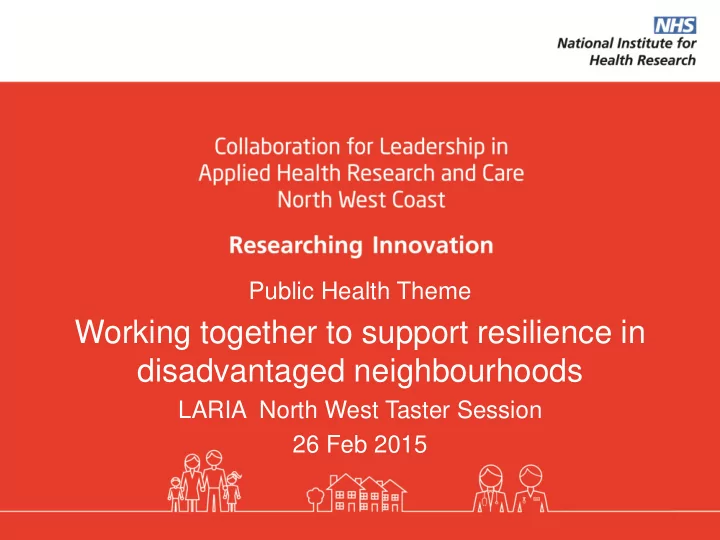

Public Health Theme Working together to support resilience in disadvantaged neighbourhoods LARIA North West Taster Session 26 Feb 2015
CLAHRC NWC core purpose: Contribute to reducing health inequalities in NW Key health challenge • Life expectancy below UK ave in 80% boroughs • Number of areas in bottom 10 nationally in terms of life expectancy • Up to 17 years difference in disability free life expectancy between most and least disadvantaged areas
Collaborations 34 partners contributing £13m+ in cash or 30 Organisations £12,377,531 kind plus £9m from NIHR Plus
Six Themes: Health inequalities across all Two cross cutting themes: North West Coast Evidence Synthesis Collaboration • Prof Rumona Dickson & Dr Angela Boland Knowledge Exchange & Implementation • Prof Mike Pearson & Prof Mark Gabbay Four topic themes: Improving Public Health • Prof Jennie Popay, Ben Barr & Gill Sadler Public Mental Health • Profs Richard Bentall & Rhiannon Corcoran Managing Complex Needs • Prof Tony Marson Delivering Personalised Health & Care • Profs Munir Pirmohammed, Ahmed ElSheikh & Dr Ana Alfirevic
Public Health Theme - Neighbourhood Resilience An up-stream response to health inequalities “Resilient [ systems ] are those that take action to enhance the personal and collective capacity of citizens and institutions to respond to and influence the course of social, economic and environmental change” (Adaptation of the definition from the Canadian Centre for Community renewal)
The Neighbourhood Resilience Programme What systems are we focusing on ? Neighbourhoods for Learning (NfL) identified by CLAHRC’s Local authority partners as areas with relatively poor health but in context of wider LA system What will the resilience programme comprise? Not a new intervention – plan is to adapt existing resilience related activities in NfL on basis of evidence and then evaluate Who will shape the programme ? • Overseen by PH Theme Programme Management group which has representatives from partner Local Authorities • Local NfL Implementation Groups including LA staff and elected members, NHS stakeholders and residents will shape the local initiatives How will it be resourced? The evaluation will be funded by NW coast CLAHRC with in kind contribution from local authority partners in terms of overseeing and shaping the initiatives (but policies/activities are already underway or planned)
Stages in the Neighbourhood Resilience Programme Map current Local Authority resilience actions/policies in UK - ongoing Review evidence on impact of these actions/policies - ongoing Share learning for Identify LA Neighbourhoods for Learning (NfL) and comparator areas - developing completed resilient systems and places. – Map resilience activities/policies in NfL and adapting on basis of evidence - continuous ongoing Establish NfL evaluation resource: household survey, neighbourhood routine datasets and community research network – in development Implementing resilience initiatives in NfL and evaluate – summer 2015
The living environment Community Economic Governance systems Social relationships The framework informing the development of our Neighbourhood Resilience initiatives
Enhancing Economic Resilience • credit unions • tackling payday lending and loan sharks • time banks and community currencies • living wage initiatives • regulating gambling • social procurement • benefit and debt advice
Resilience-enhancing Living Environments • green spaces – planning, promoting use • redesigning the streetscape • addressing fuel poverty • improving the local food environment • decent homes initiatives • selective licensing of landlords
Enhancing Resilient Social Relationships • Initiatives to reduce social isolation • Creating civic/social spaces or community meeting points • Community arts • Volunteering
Enhancing Resilience through Community Governance Community involvement in decision making structures and processes: • Participatory budgeting • Community Governance Groups e.g. social housing • Community Development Trusts • Community asset ownership • Neighbourhood committees • Citizen juries
Evaluating the Resilience Programme: Creating a Neighbourhood Research Resource • The Neighbourhoods for Learning ( NfL) Integrated Longitudinal Research Resource will provide the basis for evaluating the resilience programme • It will provide data for each Neighbourhood for Learning from three sources: • A longitudinal household survey, • A range of longitudinal routine and administrative data. • A Community Research Network • The resource will be made available to CLAHRC partners to use as they wish
Evaluating the Resilience Programme: Creating a Community Research Network • Each local authority partner will identify a community organisation in the NfL or with links to it • These organisations will be brought together to form a network which, with help from CLAHRC researchers, will • recruit a cadre of local people to be trained as community researchers and support them to undertake research including: • extensions of the longitudinal household survey • other participative and qualitative research in the NfLs. • CLAHRC, or organisations commissioned by CLAHRC, will provide training for the community researchers • Community researchers will receive accreditation for training and will be paid for the work they do
A local authority perspective
Partner local authorities • Cheshire West and Chester • Sefton • Blackpool • Lancashire • Knowsley • Liverpool • BwD ….Cumbria….Halton ….
A local authority perspective
A local authority perspective A journey… Opportunities and challenges • Links/working together • Moves towards E-B commissioning organisation – enhancing understanding of the evidence base • Training opportunities • Organisational buy in • Member buy in • Organisational change • Complexity(ies) of programme, work stream(s) and project(s)
Moving forward… • Reviews/training • Implementing research locally • Updates in the future
Thank you! For more info contact… Dr Sarah Mosedale Senior Research Associate/Theme Manager NIHR CLAHRC NWC Public Health Theme s.mosedale@lancaster.ac.uk Collaboration for Leadership in Applied Health Research and Care North West Coast Dr Helen Bromley Consultant in Public Health Cheshire West and Chester Council helen.bromley@cheshirewestandchester.gov.uk
Recommend
More recommend